Matt Rees's Blog - Posts Tagged "james"
My 5 favorite novels
My second Palestinian crime novel A Grave in Gaza (UK title: The Saladin Murders) is just now published in Holland. The Dutch newspaper de Volkskrant asked me to contribute a list of my five favorite books, or at least those which've had the biggest impact on me as a writer. Here's what I wrote:
Let It Come Down – Paul Bowles
Writers look for resonance. You might say Bowles has us with his title alone, which resonates with doom even before he writes his first sentence. (It’s drawn from “MacBeth.” When the murderers come upon Banquo, he says that it looks like there’ll be rain. The murderer lifts his knife and says: “Let it come down.” Then he kills him.) But with this novel about Morocco, as in his more famous Algerian novel “The Sheltering Sky”, Bowles was even more resonant. When writing, he would often travel through North Africa. Each day, he would incorporate something into his writing that had actually happened during the previous day’s journey. Working in the Middle East, I often follow that technique, adding details from yesterday’s stroll through the Muslim Quarter of Jerusalem or a refugee camp in Bethlehem.
The Long Goodbye – Raymond Chandler
This is the novel that Chandler labored over longest and thought his best. He was right. It exposes a deep emotional side to his great detective creation Philip Marlowe. Chandler was the greatest stylist of Twentieth Century American fiction. Try this image, when a beautiful woman has just walked into a bar full of men and everyone falls silent to look at her: “It was like just after the conductor taps on his music stand and raises his arms and holds them poised.” Chandler inspires me to make every image in my book as good as that.
The King Must Die – Mary Renault
I was heading for Jordan to cover the dieing days of King Hussein a decade ago. I happened to pick up a used copy of this book -- the title seemed appropriate. But as I waited in a rainy Amman winter for the poor old monarch to die, I discovered that Renault had a capacity to describe the classical world as though she had lived through that era. Her novels are the best portrayal of homosexual love and of the great values of Greece in literature anywhere.
The Cold Six Thousand – James Ellroy
I love to see real characters from Hollywood and Washington turn up in Ellroy’s terse, hip, hardboiled poetic fiction. This story of CIA/FBI renegades in the aftermath of the Kennedy assassination is perfect. I saw Ellroy read years ago in New York and he blew me away. If you can find a better opening paragraph to a chapter than this one, let me know: “Heat. Bugs. Bullshit.” Dig it.
The Power and the Glory – Graham Greene
Greene went to Mexico to research a travel book, but he showed that journalistic research can turn into literature of great spirituality with this story of a drunken priest on the run. I try to remember that as I flick through my old reporter's notebooks for new ideas for my novels. Greene's is such a powerful examination of the loss of belief that it captivates even a non-Catholic, non-believer like me. The scene where the priest steals a hunk of meat from a stray dog is astonishing. The priest starts to beat the dog: “She just had to endure, her eyes yellow and scared and malevolent shining back at him between the blows.” Like Mexico under dictatorship. Like the priest before a disapproving God.
Let It Come Down – Paul Bowles
Writers look for resonance. You might say Bowles has us with his title alone, which resonates with doom even before he writes his first sentence. (It’s drawn from “MacBeth.” When the murderers come upon Banquo, he says that it looks like there’ll be rain. The murderer lifts his knife and says: “Let it come down.” Then he kills him.) But with this novel about Morocco, as in his more famous Algerian novel “The Sheltering Sky”, Bowles was even more resonant. When writing, he would often travel through North Africa. Each day, he would incorporate something into his writing that had actually happened during the previous day’s journey. Working in the Middle East, I often follow that technique, adding details from yesterday’s stroll through the Muslim Quarter of Jerusalem or a refugee camp in Bethlehem.
The Long Goodbye – Raymond Chandler
This is the novel that Chandler labored over longest and thought his best. He was right. It exposes a deep emotional side to his great detective creation Philip Marlowe. Chandler was the greatest stylist of Twentieth Century American fiction. Try this image, when a beautiful woman has just walked into a bar full of men and everyone falls silent to look at her: “It was like just after the conductor taps on his music stand and raises his arms and holds them poised.” Chandler inspires me to make every image in my book as good as that.
The King Must Die – Mary Renault
I was heading for Jordan to cover the dieing days of King Hussein a decade ago. I happened to pick up a used copy of this book -- the title seemed appropriate. But as I waited in a rainy Amman winter for the poor old monarch to die, I discovered that Renault had a capacity to describe the classical world as though she had lived through that era. Her novels are the best portrayal of homosexual love and of the great values of Greece in literature anywhere.
The Cold Six Thousand – James Ellroy
I love to see real characters from Hollywood and Washington turn up in Ellroy’s terse, hip, hardboiled poetic fiction. This story of CIA/FBI renegades in the aftermath of the Kennedy assassination is perfect. I saw Ellroy read years ago in New York and he blew me away. If you can find a better opening paragraph to a chapter than this one, let me know: “Heat. Bugs. Bullshit.” Dig it.
The Power and the Glory – Graham Greene
Greene went to Mexico to research a travel book, but he showed that journalistic research can turn into literature of great spirituality with this story of a drunken priest on the run. I try to remember that as I flick through my old reporter's notebooks for new ideas for my novels. Greene's is such a powerful examination of the loss of belief that it captivates even a non-Catholic, non-believer like me. The scene where the priest steals a hunk of meat from a stray dog is astonishing. The priest starts to beat the dog: “She just had to endure, her eyes yellow and scared and malevolent shining back at him between the blows.” Like Mexico under dictatorship. Like the priest before a disapproving God.
Ellroy Queen: Megan Abbott’s Writing Life

Megan Abbott is the female James Ellroy. When I read her Edgar-award-winning “Queenpin,” I immediately was put in mind of everyone’s favorite noirmeister. Dig it. Even more I loved “The Song is You,” in which Abbott took a real-life missing persons case from 1949 and plumbed her Hollywood characters for real debauchery and dirt like Ellroy at his best. Dr. Abbott (she has a Ph.D. in English and American Literature from New York University) has a great new one that’s a US Independent Booksellers pick for August. As for how she does it, read on, checking out her particularly intriguing writing exercise. As someone might write: Off the record, on the Q.T., and very hush, hush.
How long did it take you to get published?
I wrote for years without finishing anything or knowing what to do with it. Once I finished a novel, it took about a year or so to get an agent and sell it. I was both stupid and lucky. Stupid because I had no idea how hard it would be, and lucky because I found an agent and an editor willing to take a chance.
Would you recommend any books on writing?
I’m sure there are good ones, but, for me, reading novels all the time is much more helpful. I once had a teacher who had us do this exercise I always remember because I use it to this day. He had us pick a favorite passage by an author and rewrite the passage by replacing every word. A noun for a noun, a verb for a verb, and so forth. I took a passage from F. Scott Fitzgerald. It was staggering how much it forced my writing out of an old rhythm and into a new one. I did it a lot with Raymond Chandler novels once I discovered them. It breaks you out of ruts and you pick up this range of cadences
What’s a typical writing day?
I start about eight in the morning and then waste many, many hours—much time lost on thesaurus.com, on following endless research trails—I collect a lot of things: old menus from the 1920s, photos of friars’ roasts from the turn of the century, abandoned diaries. I get lost in them and it can, easily, take me four hours to produce a page, and when I do, it’s usually in a mad rush inspired by guilt for all that procrastinating.
Plug your latest book. What’s it about? Why’s it so great?
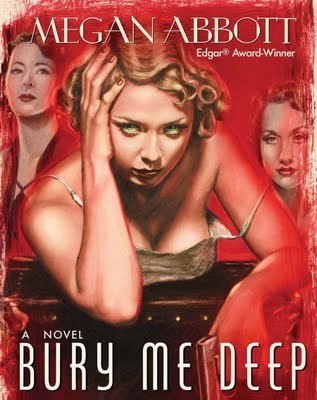
It’s a strange little tabloid tale loosely based on a famous real-life crime from the 1930s—the Winnie Ruth Judd “Trunk Murderess” case. It’s called Bury Me Deep and it follows Marion Seeley, a young woman left by her husband in Phoenix at the height of the Great Depression. Very naïve, very lonely, she falls in with two of the town’s single gals, gals with reputations: Soon enough, she’s swept up in their freewheeling lifestyle, the “thrill parties” they throw. At one of these parties, she meets and falls hard for charming Joe Lanigan, a rising town leader who proves her downfall.
How much of what you do is:
a) formula dictated by the genre within which you write?
b) formula you developed yourself and stuck with?
c) as close to complete originality as it’s possible to get each time?
I am a genre lover—so much so that I like to knock them together. For Bury Me Deep, for instance, the idea was to merge a very traditional melodrama—a woman who faces this almost Edith-Wharton-style dilemma (follow society’s rules or one’s own heart) with a down-and-dirty pulp story of drugs, sin and murder. I think it’s probably true in all my novels—with the possible exception of Queenpin, which I tried to make as close as possible to classic pulp fiction. I think all genres are in many ways one genre, with different accessories. In the end, we’re all fighting social rules, society itself, or all fighting ourselves—which is kind of the same thing.
What’s your favorite sentence in all literature, and why?
Did you ever have a sister, from Faulker’s The Sound and the Fury. In a book swollen with words, twisting and curling on themselves, pounding and thundering—it can still be gathered into in that simple line. And, when that line comes—which it does, more than once—it’s a heartbreaker.
What’s the best descriptive image in all literature?
Humbert Humbert describing Lolita’s feet, or Raymond Chandler describing almost anything.
Who’s the greatest stylist currently writing?
Daniel Woodrell.
Who’s the greatest plotter currently writing?
I guess I don’t really read for plot. In fact, many of my favorite books have rambling, meandering plots.
How much research is involved in each of your books?
For the historical ones—set in the 1930s-60s—a lot, but not in any coordinated way. For Bury Me Deep, I read a lot about TB hospitals and morphine addiction. Then, after a few months, I stop researching and start writing—it’s hardest for me to both at the same time.
Where’d you get the idea for your main character?
She’s modeled on her real-life counterpart, Winnie Ruth Judd, but Marion ends up veering pretty wildly. There was only so much I could find out about what went on in Winnie Ruth’s head, so I ended up making up the rest and soon enough Marion was all her own.
Do you have a pain from childhood that compels you to write? If not, what does?
Only boredom. I had a wonderful childhood with great, creative parents and brother, but it was old-school suburbia and I wasn’t imaginative enough to find the magic in it. I felt like I was just killing time.
What’s the best idea for marketing a book you can do yourself?
Golly, I have no idea. You tell me.
What’s your experience with being translated?
It’s fun to see the editions and see if/how they package it differently. I have no idea if those pages correspond to what I wrote, which is kind of a neat feeling.
Do you live entirely off your writing? How many books did you write before could make a living at it?
No. I work at a nonprofit four days a week and it keeps me honest and “in the world.” I have trouble being at home all day, living in my head. I think that requires a mental strength I don’t have.
How many books did you write before you were published?
No finished ones. But dozens of false starts and embarrassments.
What’s the strangest thing that happened to you on a book tour?
I arrived in Scottsdale, Arizona with Vicki Hendricks, famous for her wonderful and very sexually explicit noir novels. It was over 100 degrees and we had a little time before our signing so we strolled into a nearby, nearly empty bar for a soda. Within ten minutes, a very drunk young man at the bar (it was only noon) kept talking to us and he confessed he was going to jail the following day. Then, he pulled down his pants to show us the tattoo on his bare bottom—the one he was sure was going to doom him in jail. It was a big beating heart and, of course, it said, “Mom.”
What’s your weirdest idea for a book you’ll never get to publish?
I never think any of my book ideas will lead to publication!
Published on August 25, 2009 07:53
•
Tags:
chandler, crime, ellroy, fiction, film, hardboiled, interviews, james, life, literature, new, raymond, writing, york
I Have Publishing Surrounded: John Higgs's Writing Life
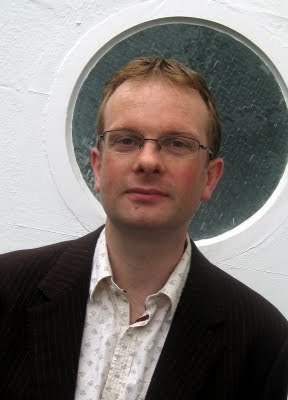
Thomas Carlyle wrote that “A well-written life is almost as rare as a well-spent one.” There may be some debate as to whether Timothy Leary’s life was well-spent. However, his biography by John Higgs is one of the most well-written and compelling books you’ll ever come across. “I Have America Surrounded: The Life of Timothy Leary” is an alternative history of the turbulent times that made modern America. Though it’s nonfiction, it reads much like James Ellroy’s hardboiled fictionalizations of the duplicitous reality behind the 1960s and 1970s in the U.S. Once you read the book and read this interview with John Higgs, you’ll understand why he was so attracted to Leary, the scientist who saw LSD as the answer to many of society’s ills and who ended up being called the most dangerous man in America by the FBI. No, not for the drugs (though one can’t rule that out….) Rather because John, an experienced tv writer and producer, is a man who doesn’t accept the idea that things simply have to be the way they seem to others.
Do you live entirely off your writing? How many books did you write before you could make a living at it?
I don't see living entirely off writing as a realistic aspiration in the Twenty-First Century, if I'm honest. It is still possible, of course, but the publishing model is in such a state of flux that only a wild and reckless gambler would wed their future financial security to it. The most significant factor, in my view, is that the amount of writing available to the reader has increased exponentially, and a sizable percentage of that is free. That alone changes everything, and threatens the writer with smaller, more fragmented audiences at best, or obscurity at worst. However, the cultural gatekeepers are also becoming increasingly irrelevant and you no longer need permission to go out and find readers. I'm delighted by all this. I love eBook readers, Print on Demand, profit-share deals with publishers and all the rest. I can't imagine a more exciting time to be a writer.
It's not the best time to be in the publishing industry, of course, as it undergoes a slow-motion nervous breakdown. The industry operates at such a 19th Century pace that if you killed it, it wouldn’t notice for eighteen months and then it would take another year to actually get round to dying. But even so, everyone can see that major, unstoppable structural change is happening. I have a hunch that in a few years time the writer-agent-publisher relationship will be start to be replaced by a writer-manager model, with publishing, promotion and distribution farmed out on a project-by-project basis while the manager concentrates on building a long-term readership for the author.
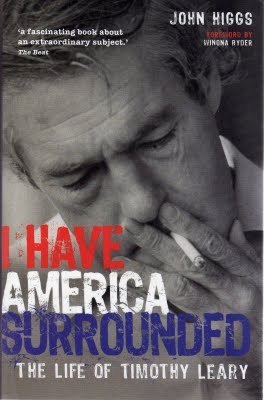
I'm not sure that everybody is prepared to be realistic about the changes that are happening. The idea of ‘writing books’ as a profession rather than a vocation, interest or even hobby is a very romantic one and people cling to it. Writers get very angry at the idea that no-one wants them to write enough to actually give them money to do it. Painters and, to some extent, musicians and actors are generally more realistic about this than writers, and also more realistic about why they do what they do. There's no reason why writers should be above working for a living - the likes of Philip Larkin or T.S. Elliot were prepared to do so. I think a big part of this is because the idea of using writing as an excuse to lock yourself away and withdraw from the world can be very seductive.
Of course, I like money. I like people giving me money, and I especially like getting money for something that I have written. But I think the writer/reader relationship is much healthier now, now that the playing field has been leveled, and if that means authors need to hold down a day job then that's a fair price to pay.
What's a typical working day?
There's no such thing as a typical working day, just as there's no such thing as a typical person or a typical philosophy. My writing life consists mainly of trying to find little two-hour windows where I can sneak off and furiously type away, without anyone giving me a hard time for doing so. You can get a surprising amount done using this method.
Do you have a pain from childhood that compels you to write? If not, what does?
I don’t know what compels me to write, but I don’t think it’s pain from childhood. My current best guess is that I write about things in order to lose interest in them. It is those things that don’t make any sense that I have a problem with. My brain is unable to digest them and they stick around, endlessly being picked over and prodded. Writing about them is the only way I know of flushing these buggers away, leaving me clear headed and hopefully a little saner.
Other writers have other reasons for writing but I don’t claim to understand what they are. Consider writer’s block, for example; being unable to write because you have nothing that you need to say. This sounds terrific to me. Imagine all the things you could do with the time! Yet other writers insist writer's block is a terrible thing, so presumably I’m failing to understand something somewhere.
How many books did you write before you were published?
My first book was published, but then I'm a lucky beggar. That said, of course, most of the stuff I write is scrappy nonsense which is written entirely for myself and shoved away in a draw and forgotten about. Only occasionally does it amount to anything that would interest others enough to justify the process of editing, polishing and all the business stuff involved in getting it published. I'm pretty lazy and would be quite happy not to have to go through all that, but it is important to be read and to have the contents of your head peer reviewed from time to time.
Who is the greatest plotter currently writing?
I'd say Steven Moffat. TV writers tend to be better plotters than novelists or film writers – at least, the really good ones are. Novelists have too much freedom and screenwriters are too restricted by the amount of people involved and the compromises that are needed when so much money is at stake. TV writers are in a middle ground where they have to hold a general audience but can't rely on big budget spectacles, so they have to get good at either plot or character, and preferably both.
Who is the greatest stlyist currently writing?
I recently read an unpublishable novella called 'The Nabob of Bombasta' by Brian Barritt, the English beatnik who you might remember from my Timothy Leary biography. I can only describe it as like literary wasabi. It is so wild and extreme that taking a little between regular literature wipes clean your mental pallette and allows you to approach your next piece with a fresh, unprejudiced mind. It is way beyond obscene and unacceptable, but it is so good-hearted, absurd and funny that anyone who claims to be offended by it is probably lying, and probably lying to themselves. Brian quite happily describes it as utterly unpublishable yet I hear it will be published next year, on Valentine's Day. Look out for that one!
What's the weirdest idea for a book you'll never get to publish?
You can publish anything these days, no matter how weird. The only constraint is whether there is an audience big enough, or interested enough, to justify your time. But as for weirdest idea, I sometimes hanker to re-publish the Bible in wildly unsuitable fonts, to see if it retains any credibility. Who wouldn't want a copy of 'The Old Testament in Comic Sans'?
What's the best descriptive image in all of literature?
That's an easy one. The best descriptive image in all of literature - better than "He Wishes for the Cloths of Heaven" or "Rough winds do shake the darling buds of May" - is Douglas Adams' "The ships hung in the sky in much the same way that bricks don't."
Plug your latest book. What's it about? Why's it so great?
Christ no - where's the fun in that?
Best Mystery Books of Year
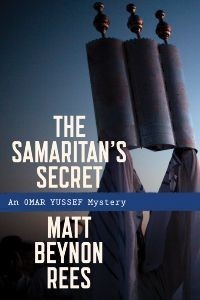
The Samaritan's Secret, the third of my Palestinian crime novels, was named one of the Best Mystery Books of the Year for 2009 by Deadly Pleasures, the crime fiction magazine with the best read on websites and what fans like. The cover you see here is from the US paperback edition of The Samaritan's Secret which'll be out in the New Year. The Deadly Pleasures list includes some of my personal favorites too--it's great to be in the company of James Ellroy, whose "Blood's a Rover" was a fitting culmination to his Underworld USA trilogy. Thanks to Deadly Pleasures. Read the rest of the list here and let me know what you think of it. Did they miss anything good?
The Decade that Dare not Speak its Name
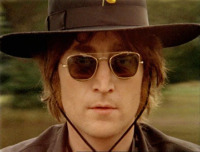 In the documentary “Imagine,” John Lennon comments that his song “Starting Over” was a message to fans his own age in which he aimed to ask them: “Hey, how’re you? Weren’t the Seventies a drag? Let’s hope the Eighties will be better.”
In the documentary “Imagine,” John Lennon comments that his song “Starting Over” was a message to fans his own age in which he aimed to ask them: “Hey, how’re you? Weren’t the Seventies a drag? Let’s hope the Eighties will be better.”If John had lived on through the Eighties to experience the decade just gone, I’m sure he’d have used a stronger word than “drag” to describe it, and it would’ve been an adjective that came easily to his lips. The noun, however, would’ve been harder to place in that sentence.
What to call the first decade of this century has been the subject of numerous articles, all of which seem to me to reflect a desire ultimately not to name the decade at all. To forget it. To put behind us its litany of disasters (Asian tsunami, Hurricane Katrina), terrorism (9/11, Madrid, London, Bombay, every third city block in Pakistan), war (Iraq, Afghanistan, the intifada) and assorted horrors (Depression, Darfur, Dick Cheney).
Op-eds opine about whether to call these 10 years the “Aughts” (an American-English misapplication of the word “nought”) or the “Naughties” or the “Zeroes” or the “Ohs.” But no one seems able to name the decade authoritatively.
That desire to forget suggests to me that the secrets of this last decade – the nastiness lurking beneath its ugly surface, the things we’d like to escape simply by refusing to name even the time in which they took place – will be perfect material for fictionalized history in years to come.
I’m thinking in particular of the kind of books James Ellroy has written about the Sixties and Seventies or David Peace about Britain in the Seventies. In “American Tabloid,” “The Cold Six Thousand” and “Blood’s a Rover,” Ellroy mined the suspicions we all had that Kennedy was really a poonhound murdered by the mob with the FBI’s connivance, that Martin Luther King went pretty much the same way, and that a group of drug-taking, pinko-fearing psychos were the engine of history, rather than people like John Lennon.
The first decade of this century seems to me prime Ellroy territory. Halliburton, Blackwater, rendition, the Patriot Act, the Department of Homeland Security all seem geared toward the secret, second history that makes Ellroy’s novels so fascinating. And the characters? Wouldn’t you like to know what really drove the recovering addict who stole the world, and what he heard from the tight lips of Uncle Dick?
In the case of Ellroy’s style, which involves using real public figures, writers have to wait for them to die, so that they can’t sue. That could hold things up. My money is on W living to be a hundred and being laid to rest in a casket made out of one of the last trees, while bloggers tweet their tributes directly into our “iFrontalcortexes.” (If I’ve violated an Apple trademark here, I apologize. Sorry, iApologize.)
So I’ve tried to get rolling on the job of fictionalizing this decade early – to show, through the prism of fiction, what really happened, and what the newspapers missed.
My series of Palestinian crime novels is intended to show the reality of life in the West Bank and Gaza during the intifada. To unveil the tribal conflicts and the battles over corrupt cash that truly dictated the course of the “uprising.” To contrast with coverage by news journalists who only got at the tip of the real meaning when they portrayed it as a struggle over a “peace process.”
I used real characters – their names changed either to protect them from attack, or to protect me and my sources from reprisals and law suits – to show the very things that journalists, who use “real” named figures in their work, failed to demonstrate.
Next month, the fourth book in the series will be out. THE FOURTH ASSASSIN takes my Palestinian sleuth Omar Yussef abroad for the first time — to New York. My aim is to examine the way the West looks at Muslims and how Muslims become marginalized or turn to extremism. To confront what we all know to be the most important issue of the decade that dare not speak its name.
You won’t find Dick Cheney in the book. But his fingerprints are all over it.



